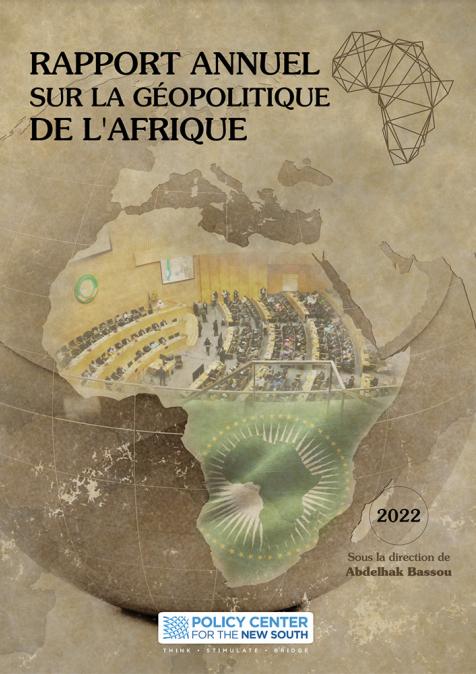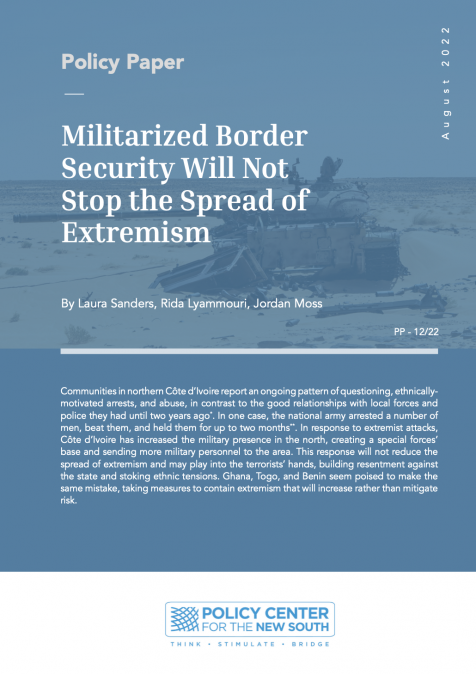Dr. Norman Sempijja, an Associate Professor at Mohammed VI Polytechnic University, explores the conflicts in the Lake Chad Basin region, which includes Nigeria, Cameroon, Niger, and Chad. These countries experience some of Africa's most severe conflicts, significantly impacting the region. In his forthcoming paper, “The Effect of Lake Chad Basin Conflicts on the Study of Civil War,” Dr. Sempijja offers valuable insights into the distinctive dynamics and challenges of this area, contributing to a deeper understanding of the conflicts in the Lake Chad Basin.
RELATED CONTENT
-
November 10, 2022Africafé est une émission du Policy Center for the New South qui décrypte l’actualité des organisations africaines et de l’Afrique. A travers de courtes interviews, l’émission tente de proposer d’aborder de manière pédagogique les enjeux des organisations africaines et l’actualité du co...
-
 AuthorsSous la direction deNovember 1, 2022Dans cette nouvelle édition du Rapport annuel sur la géopolitique de l’Afrique, et à l’instar des éditions précédentes, le maître-mot est la richesse dans la diversité. Une diversité dans les visions et les opinions que des auteurs africains, habitués de cette tribune où qui la découvrent, alimentent en exprimant leurs réflexions sur des questions clés qui intéressent leur continent : l’Afrique. Du cadre social, à celui militaire en passant par les contextes historiques, anthropolo ...
AuthorsSous la direction deNovember 1, 2022Dans cette nouvelle édition du Rapport annuel sur la géopolitique de l’Afrique, et à l’instar des éditions précédentes, le maître-mot est la richesse dans la diversité. Une diversité dans les visions et les opinions que des auteurs africains, habitués de cette tribune où qui la découvrent, alimentent en exprimant leurs réflexions sur des questions clés qui intéressent leur continent : l’Afrique. Du cadre social, à celui militaire en passant par les contextes historiques, anthropolo ... -
October 27, 2022Dans cette édition spéciale, le Général Mohamed Znagui Sid’Ahmed Ely décrypte les approches de contre terrorisme au niveau national et régional et appuie sur l'importance des approches collectives tel que le G5 Sahel pour l'endiguement de l'expansion de la menace terroriste. ...
-
AuthorsOctober 21, 2022The sixth African Peace and Security Annual Conference (APSACO) was held on July 20-21, 2022, under the theme 'African Security in Times of Uncertainties'. The two-day event was composed of five panels and one report discussion. • Panel 1: The Impact of the Russia-Ukraine War on Africa • Panel 2: Conflict Resolution and w in Africa • Panel 3: The Worsening of the Food-Security Challenge in Africa • Panel 4: Security Implications of Climate Change in Afr ...
-
AuthorsAugust 9, 2022Communities in northern Côte d’Ivoire report an ongoing pattern of questioning, ethnically- motivated arrests, and abuse, in contrast to the good relationships with local forces and police they had until two years ago*. In one case, the national army arrested a number of men, beat them, and held them for up to two months**. In response to extremist attacks, Côte d’Ivoire has increased the military presence in the north, creating a special forces’ base and sending more military per ...
-
July 21, 20222021 was a year of global geopolitical disruption and geo-economic upheaval. As events gather momentum, the world enters a period of geopolitical and geo-economic transition; the end of one historical cycle foreshadowing the uncertain prospects of a new one. We are henceforth, in presen...
-
July 21, 2022كانت سنة 2021 سنة اضطراب جيو-سياسي وانقلاب جيو-اقتصادي عالميين. ومع تزايد زخم الأحداث، دخل العالم فترة تحول جيو-سياسي وجيو-اقتصادي تعلن نهاية دورة تاريخية وتُنبِّؤ بآفاق غير مؤكدة لدورة جديدة. وعليه، فإننا من الآن فصاعداً أمام تغير عالمي حقيقي ينطوي على نقاط ضغط متعددة وقوىً دافعة جيو-س...
-
July 21, 2022L'année 2021 a été le théâtre de perturbations géopolitiques et de troubles géoéconomiques à l'échelle mondiale. À mesure que les événements s'accélèrent, nous entrons dans une période de transition géopolitique et géoéconomique ; la fin d'un cycle historique laissant présager les persp...
-
July 20, 2022L'année 2021 a été le théâtre de perturbations géopolitiques et de troubles géoéconomiques à l'échelle mondiale. À mesure que les événements s'accélèrent, nous entrons dans une période de transition géopolitique et géoéconomique ; la fin d'un cycle historique laissant présager les persp...
-
July 20, 20222021 was a year of global geopolitical disruption and geo-economic upheaval. As events gather momentum, the world enters a period of geopolitical and geo-economic transition; the end of one historical cycle foreshadowing the uncertain prospects of a new one. We are henceforth, in presen...




